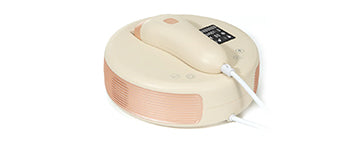When you're pregnant, selecting a safe hair removal method becomes more crucial. While laser, IPL, and electrolysis are generally safe, their appropriateness during pregnancy is debatable. This blog delves into the concerns associated with laser hair removal when expecting, backed by expert advice and medical studies. We will also explore safer alternatives and provide tips for managing body hair during pregnancy.
How does laser hair removal work?
Laser hair removal works by sending a beam of light through the skin to target the hair. The light is absorbed by the pigment in the hair, converting into heat, which then damages the hair follicles—the small structures in your skin that grow hair. If the heat completely destroys a follicle, it won't grow hair again. If only partially damaged, the hair may eventually grow back, but it will typically be thinner and lighter than before. This process allows for targeted hair removal and gradually reduces hair growth over time.
Does body and facial hair increase during pregnancy?
During pregnancy, you experience a significant increase in hormone levels, particularly estrogen, and androgen, which can lead to unexpected hair growth in areas like your belly, face, neck, breasts, and arms, especially in the third trimester. This is a common occurrence; the extra hair typically sheds after you have your baby.
Pregnancy hormones also affect the normal hair growth cycle. Usually, hair grows, rests, and then falls out. But the shedding phase is delayed during pregnancy, making your hair appear thicker and fuller.
About three to six months postpartum, as hormone levels return to normal, You may observe more hair shedding, a condition referred to as telogen effluvium.
Considering these changes, you might be tempted to look for hair removal options like laser treatment. However, it's advisable to consider the temporary nature of pregnancy-related hair changes and consult a healthcare provider before opting for any permanent hair removal treatments.
Can you get laser hair removal when you're pregnant?
Can you undergo laser hair removal while pregnant? The safety of this procedure during pregnancy isn't well-established due to limited research. Many health experts, including those from the NHS, recommend avoiding it because the potential effects on both the developing fetus and the mother are not fully understood.
Doctors like Dr. Stephanie Hack and Dr. Kelly Jago suggest postponing any non-essential laser treatments until after pregnancy as a safety measure. A 2017 International Journal of Women's Dermatology review highlights that although lasers are used safely for some medical conditions during pregnancy, this doesn't necessarily apply to cosmetic procedures like hair removal, where specific data is lacking.
Pregnancy can also bring about changes such as hyperpigmentation, which might reduce the effectiveness of laser treatments that rely on the contrast between hair and skin color. Moreover, pregnancy affects the normal hair growth cycle and increases skin sensitivity, which could mean needing more treatment sessions and experiencing greater discomfort.
Given these factors, the general consensus among medical professionals is to take a cautious approach and avoid elective laser hair removal during pregnancy. This is advised to safeguard against any potential risks to both the mother and the baby.
Does laser hair removal impact pregnancy or fertility?
Laser hair removal does not impact fertility or increase the risk of miscarriage. If you plan to conceive, it's wise to consult your doctor before beginning treatments. Although the procedure is generally safe and doesn't cause infertility, it requires several sessions over a few months. Starting treatment unknowingly while pregnant could expose you to risks such as skin irritation, changes in skin color, blistering, scarring, and, in rare cases, excessive hair growth.
What are other safe hair removal options during pregnancy?
During pregnancy, it's essential to choose safe hair removal methods due to increased skin sensitivity and the risk of hyperpigmentation. Conventional methods like shaving, waxing, and using depilatory creams are generally considered safe, but it's crucial to use products that are free from harsh chemicals and to maintain a hygienic environment.
Shaving: This is highly recommended because it doesn't involve harsh chemicals. However, care should be taken to avoid cuts and nicks, which can lead to infections. It's advisable to avoid shaving close to your due date to prevent any risk of infection.
Waxing and Threading: These methods are safe, but since they can be painful due to increased skin sensitivity during pregnancy, they should be done with caution.
Depilatory Creams: If opting for hair removal creams, choose those free from thioglycolic acid and barium sulfide, which can be harsh on your skin and potentially harmful. Always test the cream on a small skin area first to check for any adverse reactions.
As your body changes during pregnancy, reaching some areas might become difficult. Getting help from a professional like an aesthetician or dermatologist is advisable, but ensure the facility is clean and the technician is licensed.
When can I resume laser hair removal after giving birth?
Before considering laser hair removal or IPL treatments postpartum, it's crucial to ensure your skin is free from cuts, allergies, or rashes and that your hormones have stabilized. Generally, a wait of 3-4 months post-delivery is recommended, and up to six months if you've undergone a C-section, to ensure proper healing.
Furthermore, since hormonal changes during breastfeeding can affect hair growth patterns, delaying laser hair removal until after you have stopped breastfeeding might yield improved outcomes. This delay allows your body to return to its normal hormonal balance, optimizing the effectiveness of the treatment and helping you achieve your desired outcomes more successfully.
Conclusion
Pregnancy introduces various changes, including increased hair growth in new areas. While this is usually temporary, managing unwanted hair during this time requires careful consideration. Safer methods like shaving, threading, or waxing are recommended based on your specific needs.
Post-pregnancy, consult your doctor to determine the right time to resume or start laser hair removal treatments, ensuring your body is ready and recovery is complete. This blog aims to guide you through safely managing hair growth during and after pregnancy, helping you make informed decisions about your body.






